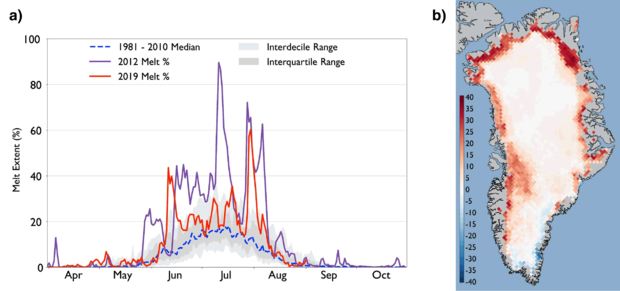Arctic report details drastic changes in warming climate
The Arctic is increasingly at risk as temperatures warm and sea ice melts away, NOAA warns in its annual report card on the state of this crucial ecosystem. At the end of a very dense, very lengthy report loaded with scores of scientific stats, the seemingly abstract , which supports infrastructure and people, is literally giving way. "We are seeing coastal landslides, large sinkholes and methane bubbling up through our ponds in summer," the indigenous authors write. It's that last part, methane release, or greenhouse gases in general, that extends far beyond the Arctic.
That's because permafrost soils, composed partially of carbon-rich organic matter, contain at least two times the amount of carbon than there is currently in the atmosphere. Because of warming, permafrost is no longer a net sink for carbon; it has become a net emitter of heat-trapping greenhouse gases into the atmosphere.
Dr. Ted Schuur is the author of the permafrost section of the report. He says these emission signals are "kind of like a 'canary in a coal mine' telling us that permafrost ecosystems are out of historical balance, and are starting to cause climate change to happen faster." This is yet another feedback which accelerates Arctic amplification.
That acceleration is vividly illustrated by melting water cascading into the ocean from Greenland. According to a separate study released Tuesday, Greenland is shedding ice seven times faster than in the 1990s. This pace is on the high end of the warming scenarios laid out by the U.N.'s Intergovernmental Panel on Climate Change (IPCC). As a result, the study estimates that 40 million more people worldwide will be exposed to coastal flooding by 2100, for a total of 400 million.

Greenland ice melt in 2019 (in red), compared to the record year of 2012 (in purple). NOAA
The Arctic Report Card makes clear that what happens in the Arctic will not stay in the Arctic — the changes reverberate all around the world and will only accelerate as the globe continues to heat. But the ones most at risk right now are the indigenous people who count on knowledge passed through the generations.
"The world from our childhood is no longer here. Our young children today are seeing so much change, but it is difficult for them to understand the pace. We are losing so much of our culture and connections to the resources from our ocean and lands," they write.
Attorney General Barr slams FBI following release of IG report on Russia probe
House Democrats unveil impeachment articles as they reach deal with White House on trade
Arctic report card shows rising temperatures and vanishing sea ice
